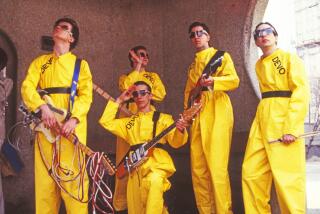Material: A Musical Meeting Ground : ‘Hallucination Engine,’ the seventh album from the Bill Laswell group, explores an unusual range of genres with artists from around the globe.
- Share via
Adventurous musical genre buster or cultural homogenizer?
Bill Laswell has been praised as the former and criticized as the latter. “Hallucination Engine,” the seventh album from Material, the variable-cast group that he masterminds, makes a strong case for his unique blend of jazz, funk, reggae, rock, hip-hop and Indian and Islamic styles in varying combinations that defies easy description.
The Detroit native first made his mark with Herbie Hancock’s ground-breaking “Rockit” in 1983 and subsequently worked with rockers Mick Jagger, Public Image Limited, Motorhead and Iggy Pop among his more than 200 production credits. All of these, to some degree, bear Laswell’s distinctive stamp, realized by his employment of a revolving cast of players drawn literally from around the globe.
“I’m much more excited about the unknown, creating the music that hasn’t been heard yet,” says Laswell, 39. “When you start to respect the responsibility of organizing, whether it’s a band or tour or recording, you get obsessed with the idea of being a catalyst, a person who can put things together and make them happen.”
As for the criticism that he’s reduced distinctive styles into a seamless, gleaming whole, Laswell counters that he is creating a common meeting ground for master musicians, free from commercial pressures.
“I’ve had really good relationships with people coming from different territories and cultures,” Laswell says. “They want to play their music with everybody--with Michael Jackson one day and some master who lives in the mountains the next. That’s coming from them--that’s not me putting that trip on anyone.”
“Hallucination Engine” is a typically unpredictable example of Laswell’s mix-and-match approach. There’s a stronger jazz component infused with Islamic and Indian music elements, all given an atmospheric, dub-influenced production. A spoken word piece with William S. Burroughs sounds like a mid-voyage stop at some intergalactic jazz lounge.
“There was no beginning concept for ‘Hallucination Engine,’ ” he explains. “I worked on it periodically over time and kept adding pieces from different recordings to the idea of this broader project. That’s customary (of how I work) but it’s a real extreme example.”
Laswell grew up in Detroit, influenced by that city’s twin musical poles: the funk of Parliament-Funkadelic and the proto-punk of Iggy & the Stooges and the MC5. His first live playing experience was in soul-funk cover bands throughout the Midwest, but he also began blurring genres by absorbing the work of experimenters in the jazz and rock realms.
“When you hear people like Coltrane being influenced by Asian music and aesthetics or Miles Davis experimenting with instruments from different cultures, you want to know where that comes from,” says Laswell. “It’s no different than kids buying a Led Zeppelin record and through that discovering Muddy Waters or Howlin’ Wolf.
“Ginger Baker was in Cream, but what was really interesting to me was his experiences in Nigeria (after that). Jimmy Page, what I connected with was things he tried like the recordings with the Bombay Symphony, incredible ideas that just never got resolved.”
Laswell moved to New York in 1977 and quickly established himself as a player in the experimental rock and jazz communities. The initial version of Material was formed as a house band for a progressive rock festival in 1979.
Laswell wasted little time building up a corps of regular collaborators ranging from big names, including former P-Funk mainstay Bootsy Collins and Burroughs, to such musicians’ favorites as Jamaica’s Sly & Robbie rhythm team. A 1982 Material album featured the pairing of fiery jazz saxophonist Archie Shepp with a then-unknown Whitney Houston.
Laswell recently ventured into Moroccan music with field recordings of Gnawa musicians and the Master Musicians of Jajouka, but a bigger shift came in 1991 when he acquired the Greenpoint Studio in Brooklyn and launched his own Island-distributed label, Axiom. With those developments, Laswell is poised for more unconventional explorations of the musical frontiers.
“I found a sound quite a while ago and I’m just spreading it out in different areas,” Laswell says. “A lot of it is based on a sonic vocabulary.
“It’s liberating to explore what you can do with technology and look for a kind of spirituality in technology as well as the musical vocabulary. I think by doing that you’re able to go that much further into the unknown.”
More to Read
The biggest entertainment stories
Get our big stories about Hollywood, film, television, music, arts, culture and more right in your inbox as soon as they publish.
You may occasionally receive promotional content from the Los Angeles Times.










